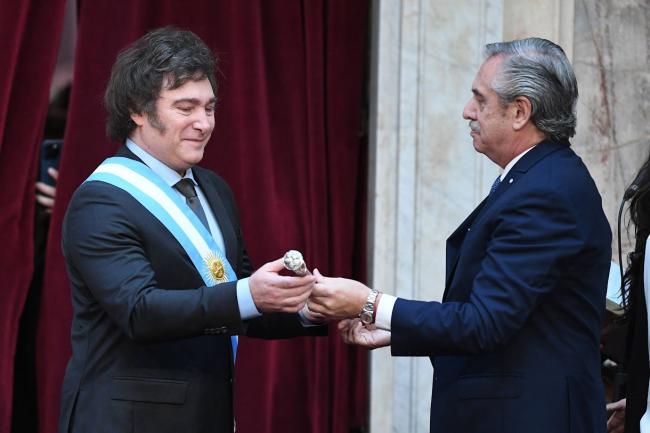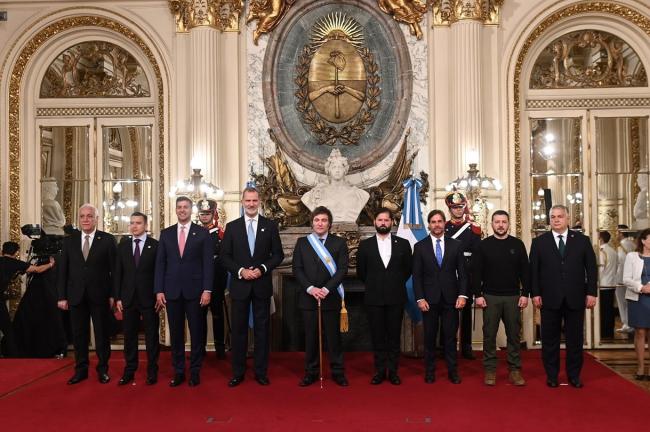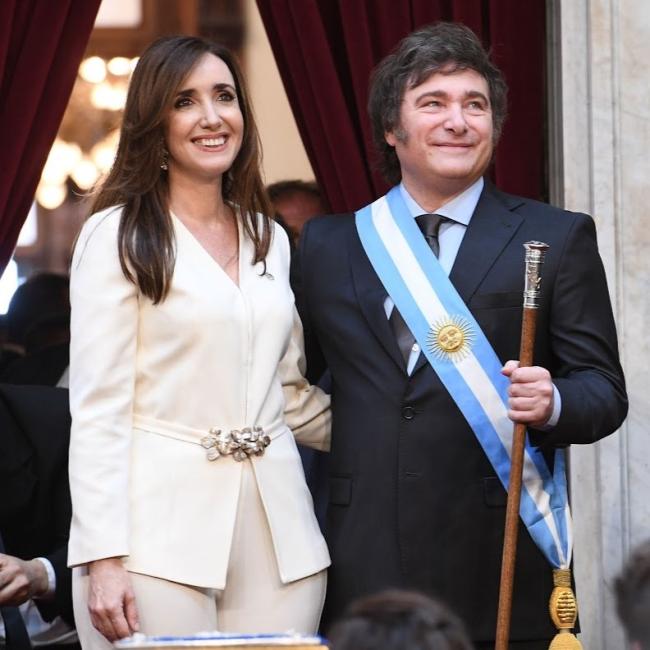
BUENOS AIRES
Denise Nieto and Aianara Lewtak, a marketing specialist and medical student, respectively, walked together toward Argentina’s National Congress in Buenos Aires on the morning of December 10. They were waiting for far-right libertarian Javier Milei to take office as president after winning the run-off election last month. “We’re beyond excited,” said Nieto, 32.
They had both followed Milei for years, but engaged more with his ideas during the Covid-induced lockdown in 2020. “The government was killing all of us financially,” Nieto said. “We joined him in the protests during that timehe spoke to us.”
They both worked for Milei to become president, but despite their hope, they said they weren’t so sure he would be successful. “We’ve supported him for years,” Nieto added. “Today is a very special day for uswe still can’t believe it.”
It was probably the feeling of disbelief that was the most widespread on inauguration day, at both ends of the national political spectrum. Milei, a relative outsider who had only sat in the Lower House for two years, secured 56 percent of the vote in the November 19 run off after a campaign in which he faced some of Argentina’s most powerful politicians. Outgoing Economy Minister Sergio Massa, who has overseen a period of runaway inflation, finished with 44 percent.
Milei’s unconventional character channeled the loss of trust in the traditional political system, which has been powered by the fallout of the Covid-19 pandemic, the impact of international conflicts, and the high level of foreign debt burdening the Argentine economy. For some, electing Milei offered the only way out of the critical situation the country is facing.
But progressive movements have vowed to resist. The day after the inauguration, labor leader Eduardo Belliboni of the Unidad Piquetera announced plans for a large mobilization on December 20 as a “warning” to Milei.
“He has announced a brutal adjustment and threatened those who are going to mobilize,” Belliboni said in a local radio interview. “This will end badly if that is his idea of how to govern.” During his inauguration speech, Milei suggested that his government will cut social welfare to those involved in roadblocks, saying, “El que corta, no cobra.”
“There will be many mobilizations and Javier Milei is afraid of that,” Belliboni added.
Milei’s political career started in 2021, when he founded his libertarian party, La Libertad Avanza (Liberty Advances). In the 2021 legislative elections, the party won him and Victoria Villarruel, now Argentina’s vice president, each a seat in the Lower House. Now, 34 new deputies and eight new senators have expanded the party’s presence in Congress.
Since entering politics, Milei has devoted himself to advocating for libertarian values, including shrinking the state, shutting down the Central Bank, and dollarizing the Argentine economy.
His ideas are not the only unusual thing about him. Milei has attracted attention for sporting an untidy Wolverine-like hairstyle, having cloned his dogs, calling his sisterwho trained to be a medium between him and his dead dog”the boss,” and having on-air breakdowns during the campaign. Some of his most controversial public statements included calling Pope Francis, who is Argentine, a “filthy leftist” and “the representative of evil on Earth.”

Traditional parties have governed Argentina since the return to democracy 40 years ago. The last administration, led by Peronist Alberto Fernández, faced the challenges of the pandemic, the impact of the Russian war on Ukraine, and the limitations imposed by the $44 billion debt to the International Monetary Fund, the largest in the IMF’s history. Peronism, a political movement created in the 1940s to represent the working class, could not match the society’s needs, leading to one of the worst losses in its history.
Now, a far-right ideology has won Casa Rosada. Many worry that the backlash from his movement could affect hard-earned rights, like legal abortion, sex education programs, policies aimed at bridging the gender pay gap, progressive taxation, public investment in scientific research, and education and cultural policies, among many others.
Milei and his economic team have said many times they will aim to shrink the reach of the state as much as possible, leaving private interests to control investment in areas where public policies once led, including public works.
“We were unable to provide a structure that could help everyone access a dignified way of life,” said outgoing President Alberto Fernández two days before Milei was sworn in. “We have expanded rights, but some are still missing. We set social justice as a horizon, but we failed to achieve it.”
Milei pledges to transform Argentine politics once and for all. But, since his win, his transition into power has shown him to be more of the same old “political caste” he promised to eliminate. His Libertad Avanza party had to negotiate with the right-wing Juntos por el Cambio (JxC) coalition, which was in power under President Mauricio Macri between 2015 and 2019 and which was responsible for taking on new IMF debt in 2018.
Now, officials from the Macri government have been appointed to some of the most crucial government positions, including the economy and security ministries. Their power within the new government could undermine the unorthodox policies Milei has pledged to install, including his promise to eliminate the national currency, the Argentine peso.
Chainsaw Politics
“A new era begins today in Argentina,” Milei told the crowds from the stairs of Congress on inauguration daya first in Argentina, but a tradition in the United States. During his speech, he warned that public spending will be cut immediately and massively. “There’s no alternative to austerity.”
As he spoke, supporters who had gathered to welcome him took photos with fake chainsaws, the symbol of his economic plan throughout his campaign.
Milei’s administration comes as Argentina weathers a critical situation. The country is facing 160 percent annual inflation, and poverty rates surpassed 40 percent this year. Milei considers himself a libertarian and is guided by an orthodox view of the economy and politics based on free market principles. But, in Argentina, the role of the state is key to millions, especially in the areas of social welfare, public education, and health.

Santiago Manoukian, an economist at a Buenos Aires consulting firm, Ecolatina, said that it remains unclear how Milei plans to carry out his extraordinary ambitions, including 5 percentage points worth of cuts in public spending in the context of a recession. “No economy minister in history has achieved such a thing,” he said. “The fiscal adjustment will impact the private sector, too.”
The question, said Manoukian, is how that austerity will be distributed across the society. But it is likely that subsidies for energy and public transportation will be the focus in the first stage. Bus and train tickets could go up by 800 percent if subsidies are eliminated.
While Milei claims the fiscal deficit needs to be fixed abruptly, Argentine history has shown that such a task is not easy to accomplish without a high degree of social conflict. The closest case is December 2001, when President Fernando de la Rúa had to resign after 2 million people took to the streets for days in a popular revolt against the economic policies that led to a financial crisis.
But, after years of economic turmoil, Milei supporters claim to be willing to accept some of the adversities of his plans.
Silvana Cejas, a 52-year-old accountant, who joined the crowds welcoming Milei, said: “We’ll see what happens, but I just heard him say budget cuts’ many times.” She smiled, holding a small Argentine flag. “This country needs a lot of purifying.”
The Fight Against “Cultural Marxism”
Milei’s win needs to be read, too, as a part of an international phenomenon. Falling under the category of “right-wing populism,” he gained strong support from U.S. Republican Party members and Brazil’s former president Jair Bolsonaro. Milei’s government has even adopted a blue logolike the one of the White Houseto symbolize its government, instead of the pink one used previously. During the campaign, he said repeatedly that his foreign policy would be, sic, “The United States and Israel.”
The tone of his speech has indeed become milder and more diplomatic after his alliance with the right-wing Juntos por el Cambio, but that has not tempered aggressions from his camp against other politicians, journalists, and feminists, among other groups.
A report by the Politics Research Team (EdiPo) published on inauguration day revealed that their register of attacks on behalf of the “radical right” increased from 20 in 2020 to 127 in 2023. LGBTQI+ communities were the most targeted in physically violent attacks this year, according to the report.
As Milei took office, the country’s democracy turned 40, having begun in 1983 when an elected government ended the dictatorship that had been in place since 1976. Since Milei was elected, human rights organizations have warned that the consensus built around democratic values will need to be especially protected.
Milei and some of his closest officials have sparked controversies by denying the crimes of the last dictatorshipthe aftermath of which is still very much present in the society. During the campaign, the president denied that 30,000 people were disappeared during the dictatorship and referred to the crimes against humanity carried out by the military junta as “excesses” in the context of “a war.” Far from a conflict between warring sides, the dictatorship is referred to in Argentina as a period of state terror.
Milei’s vice president, Victoria Villarruel, has openly advocated for the rights of those who committed genocide and defended the so-called theory of two demons, which compares the terrorist attacks carried out by left-wing guerrillas in the 1970s to the state terror that disappeared over 30,000 people and kidnapped more than 500 babies born in captivity.
Several Libertad Avanza leaders have also spoken out against the legal abortion law, passed in 2020, although some have said over the last few weeks that overturning the legislation will not be immediate nor at the center of the government’s political agendaat least for now. Many of the party’s members, including Milei, have denied climate change or suggested that it is exaggerated, claiming it is a part of a scheme called “cultural Marxism.”
“I expect [the government to bring] freedom, progress, wealth, a new culture war,” said Milei supporter Lewtak, 21, as she awaited for the new president to salute his supporters. “It’s the comeback of merit and work: the culture war is bringing back morals and values that we’re lacking in Argentina.”
Lucía Cholakian Herrera is a freelance reporter from Buenos Aires covering politics and human rights in Latin America.

